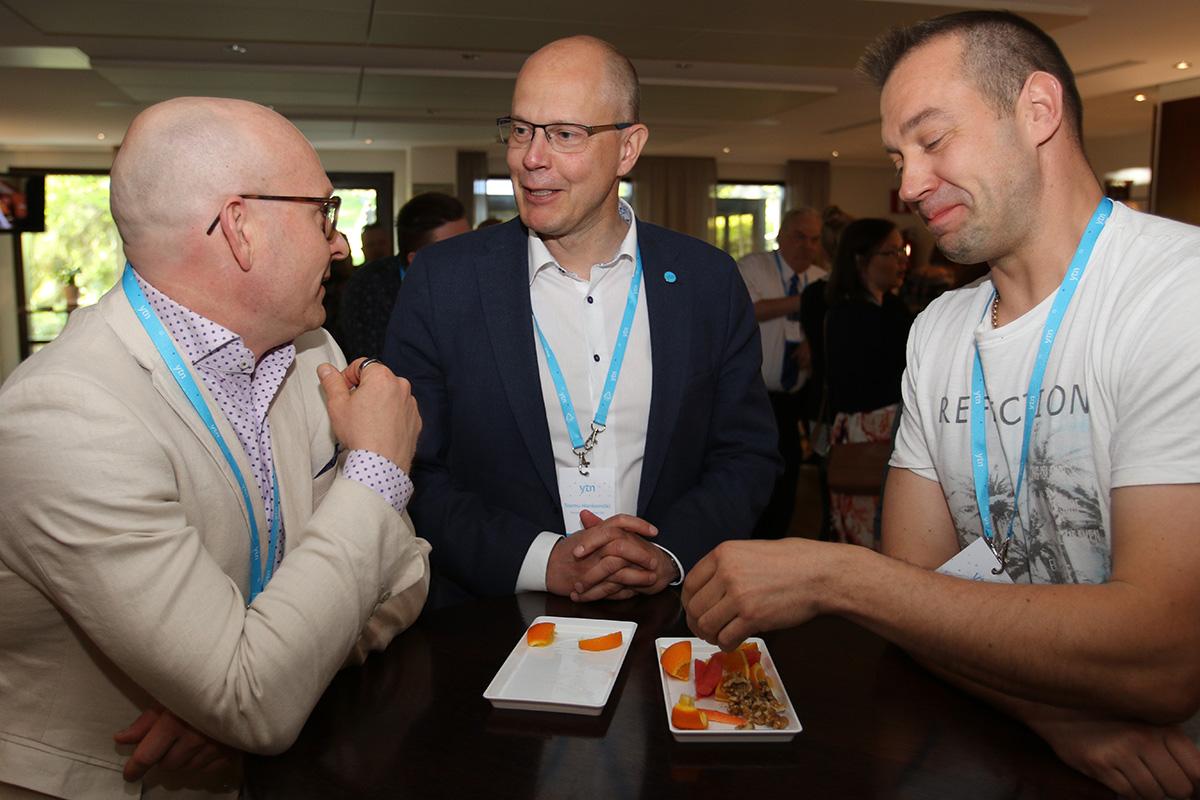
Photo: Teemu Hankamäki among his people. In May, YTN’s representatives discussed the protracted round of labour market negotiations.
Teemu Hankamäki, Chairperson of YTN since 2018, thinks the 50-year-old negotiation organisation has established itself as a major labour market player. “We know how important we are, and we also know what we are here for,” he says.
The Federation of Professional and Managerial Staff YTN, a private-sector negotiation organisation at Akava, is officially celebrating its 50th anniversary in October. Hankamäki, who started working at the Academic Engineers and Architects in Finland TEK in 2005, has seen the last two of the organisation’s five decades first-hand. For the past ten years, he has held top positions at YTN, acting as Secretary General from 2014 to 2017 and as Chairperson since the beginning of 2018.
According to Hankamäki, YTN has made a long and admirable journey to become one of the country’s most significant labour market organisations.
“The number of members in YTN unions has grown staggeringly at the same pace as the importance of senior salaried employees and experts has increased in the labour market. Changes in the education system have also contributed to this development. The large membership, now totalling 180,000 senior salaried employees, has taken us forward. We have proved our worth but as in many other fields, the work never ends in lobbying activities.”
The field is in transition, and lobbying is changing
YTN negotiated its first national collective agreement for the technology industry in December 1994. A couple of months later, a consulting sector agreement was concluded. After that, collective agreements were negotiated in other sectors as well but, in some sectors, it has been necessary to agree on the terms of employment of senior salaried employees through other means.
“Unfortunately, not all employers considered collective agreements necessary for senior salaried employees,” Hankamäki acknowledges.
According to Hankamäki, the labour market is now at a turning point. There is a trend towards replacing generally applicable collective agreements with company-specific agreements. This transition has already emerged in both the industrial and service sectors.
“The IT services industry was the first contract branch in which generally applicable agreements were abandoned, and 15 company-specific agreements have been concluded for large and medium-sized enterprises. Fortunately, this change occurred in an industry that is doing well, and the agreements signed are excellent, but YTN and its member unions must also be able to ensure decent terms of employment for their members in other types of circumstances,” Hankamäki says.
The importance of well-being at work increasing
Over the decades, YTN has worked hard to ensure that sectors without their own collective agreement would get one. There are several such sectors, including commerce, the forest industry, the construction industry and the food industry.
According to the chairperson of the negotiation organisation, the conclusion of new sector-specific collective agreements for senior salaried employees is already becoming a fantasy in a world where the pressure for company-specific and local agreements is increasing.
“The world is changing, as are situations. Still, our basic task stays the same: we must ensure decent terms of employment for our members and promote their interests, regardless of what is happening around us. The best way to do this is to have a common vision of what we want,” says Hankamäki.
In his opinion, the members’ well-being at work and quality at work will become all the more important issues in lobbying activities in the coming decades. The fact that people must manage to keep working until an increasingly older age makes it very necessary to maintain their physical and mental working capacity.
“Here, if anywhere, we need to understand we are in the same boat. Well-being at work is our common concern. Burnout is equally hard for engineers and librarians,” Hankamäki concludes.
Respect and praise for the field
Hankamäki argues that trade unions are as strong as the union members that make up the field. In YTN, the field is represented by sectoral background groups and shop stewards in companies.
“Their importance as a group can’t be emphasised enough. Personnel representatives are YTN’s eyes and ears in companies. Through them, we get a picture of the current situation in the industry.”
“The shop stewards and background group members are a competent and trained team that, at its best, acts not only as a sectoral decision maker but also as a mentor. We need to listen to what they want instead of telling them what we want them to want,” Hankamäki says.
In recent years, YTN has strengthened its office. The office staff has grown from one to five in ten years. Hankamäki believes the office plays an important role in supporting the actual negotiation activities.
“I believe we will develop this into a fine ensemble over time. Obviously, the unions and their employees must have their role in negotiation activities because this is important for the unions’ own activities.”
This article was originally published in the Insinööri journal.
Author of the article and photo: Jari Rauhamäki
